Level 3 Food Hygiene and Safety in Manufacturing
Quantity: 1
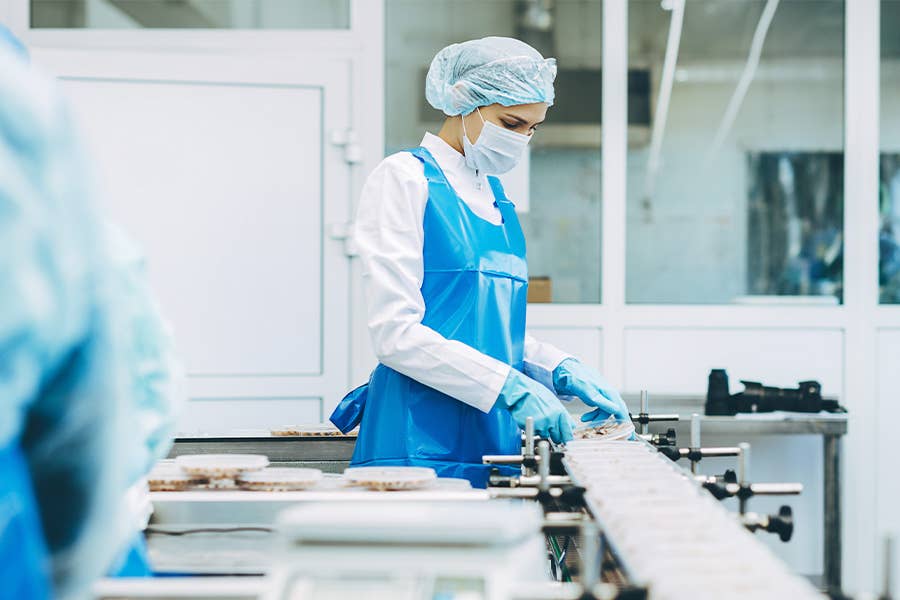
Duration 8-10 hours
Last audited 6th March 2025
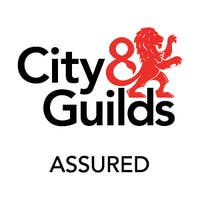
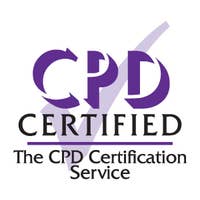
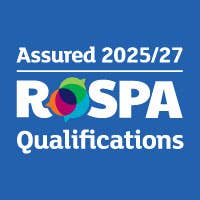
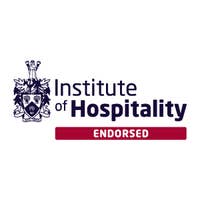

100% online training
Start when you like
Learn on any device (desktop, mobile or tablet)
Instant assessment and result
1 learner per course
Train teams of all sizes
Bulk discounts starting at 10% off 10 courses
Pay by invoice with 30 day payment terms available (5+ courses)
Includes a 10% discount for 10+ courses
If you are a manager or supervisor of a food manufacturing premises, then you have an important role to play in promoting food safety legislation in the workplace and encouraging other staff members to follow good hygiene practices. By law, all food handlers must be appropriately trained, and this Level 3 course helps those in management and supervisory roles understand their essential day-to-day responsibilities, including how to implement the basics of a HACCP food safety management system.
The course provides knowledge of food hygiene practices and legal responsibilities and gives further detail on the controls that can be implemented to ensure that the food handling process is as safe and hygienic as possible. The course uses a variety of written text, interactive exercises, video content and downloadable resources to provide learners with up-to-date knowledge of how to comply with, and uphold, food safety law in their workplace.
100% online training
Access anywhere
Same day digital certificate
Printed certificate posted next working day
Full audio voiceover
Assessment retakes at no extra cost
Learn at your own pace with no completion deadlines
Accepted by Local Authorities
City & Guilds Assured
Accredited by CPD, assured by RoSPA Qualifications, endorsed by the Institute of Hospitality
Reviewed by an independent lead auditor
Bulk discount for orders of 10+ courses
This level 3 course provides learners with knowledge to an industry recognised standard

Save on our courses when you buy more training upfront. Lock in a better price now and access the training whenever you need to. You can mix and match any of our courses too and get the discount off your whole order.
10+ courses = 10% off
50+ courses = 20% off
100+ courses = 30% off
500+ courses = 40% off
By the end of this course learners will:

City & Guilds Assured
Thoroughly reviewed independently by City & Guilds learning and development experts, this course is approved as City & Guilds Assured. High Speed Training is the first e-learning provider to have online courses awarded City & Guilds Assured status.
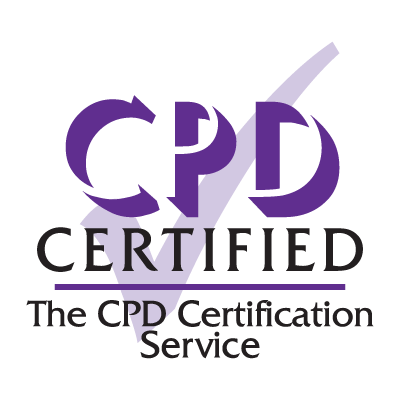
Accredited by CPD
All of our courses are accredited by the CPD Certification Service as conforming to universally accepted Continuing Professional Development (CPD) guidelines.
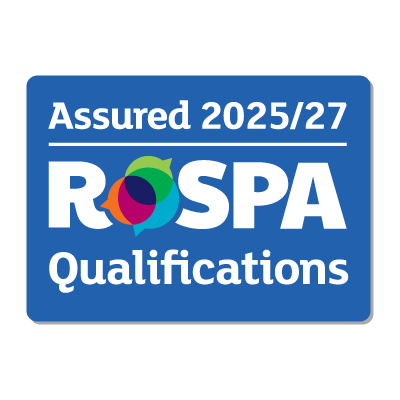
Assured by RoSPA Qualifications
This course is also assured by the Royal Society for the Prevention of Accidents through their RoSPA Qualifications Assurance System, as providing up-to-date, quality and content-approved training.
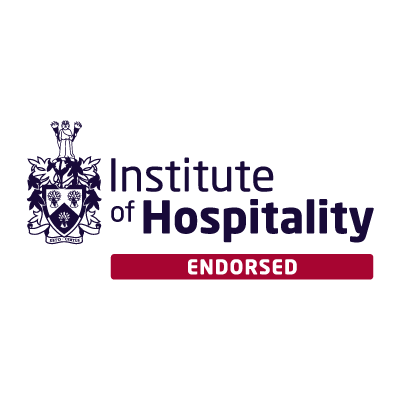
Endorsed by the Institute of Hospitality
Additionally, this course is endorsed by the Institute of Hospitality as providing independently-evaluated, quality content that teaches good practice standards.

Audited and approved by EHOs
This course has been audited and approved by Environmental Health Officers: the training materials have been independently reviewed and are verified as containing the necessary knowledge to achieve the level of training specified.
Recommended renewal:
3 years
What does this mean? This certificate does not have an expiry date, however, based on industry best practice guidelines there is a recommended renewal period.
Our in-house Learning Designers develop all of our courses to give you and your learners the most engaging training possible.
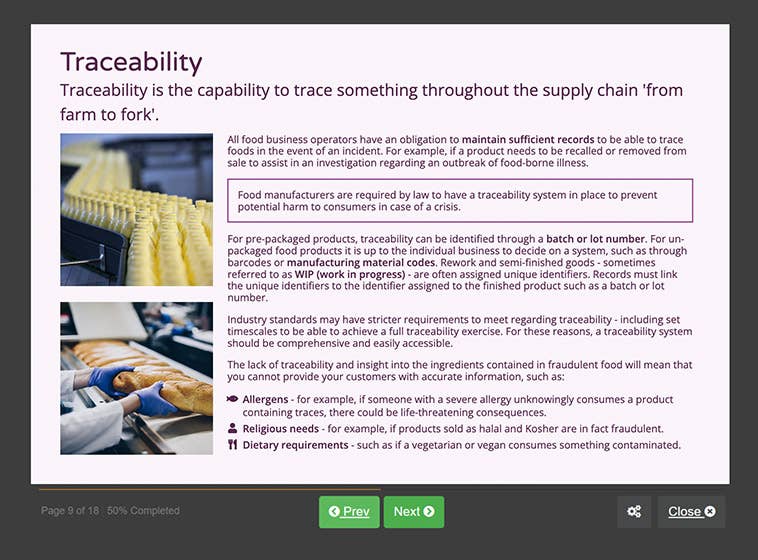
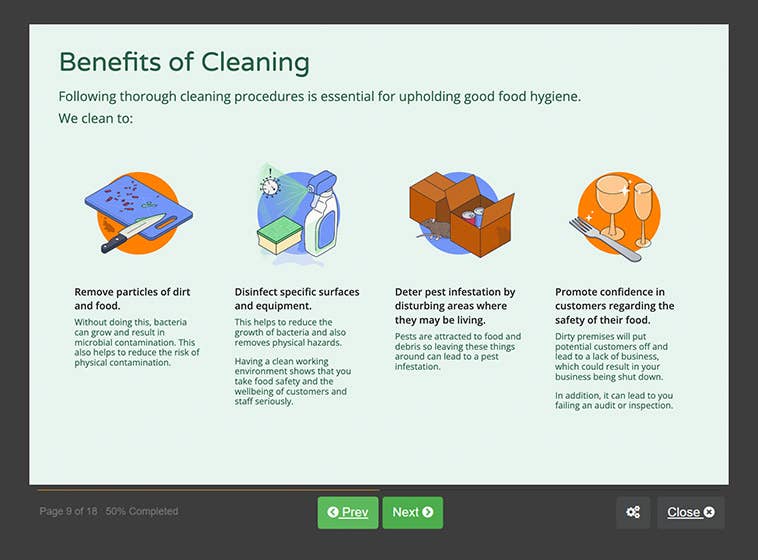
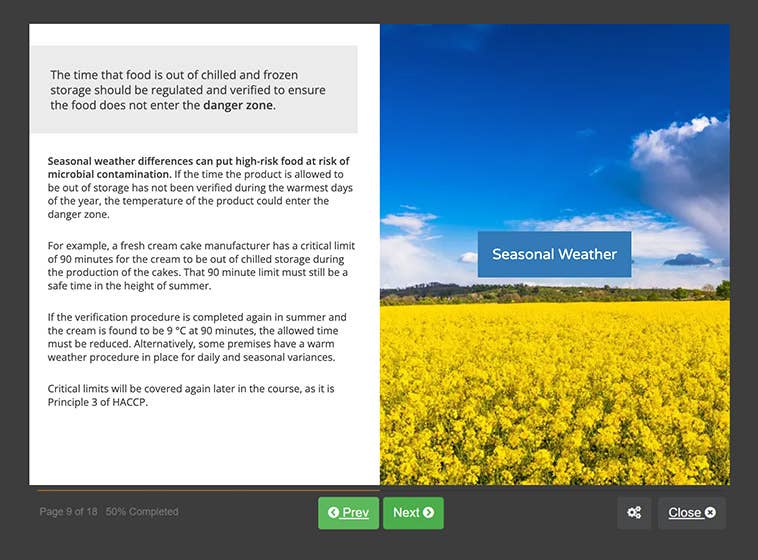
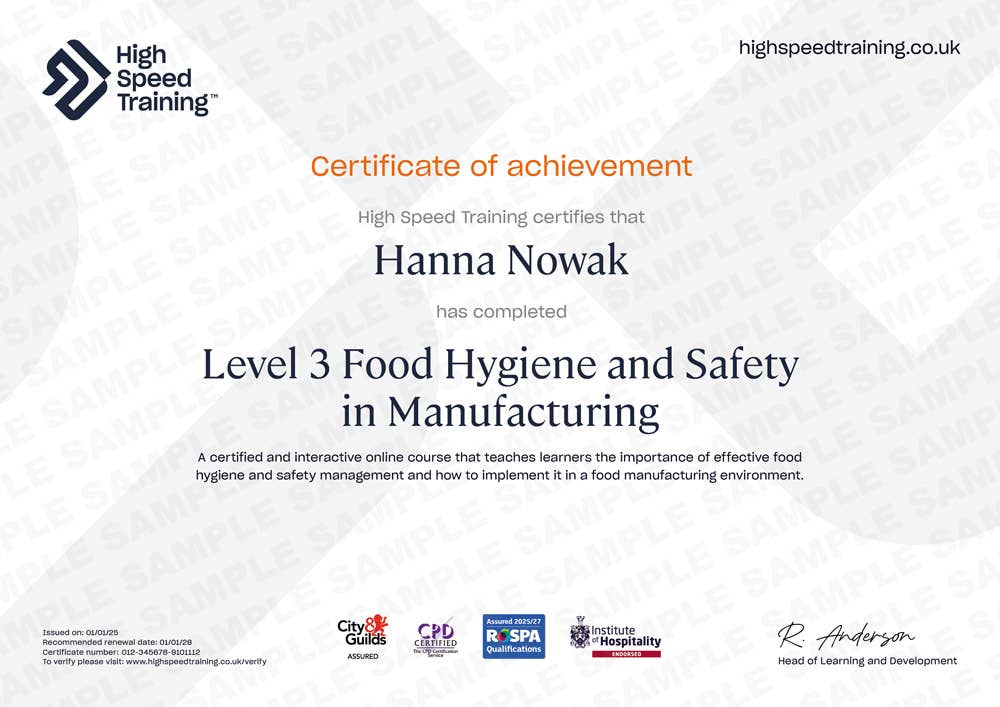




Over 2 million cases of foodborne illness occur in the UK every year. The risk of illnesses from food increases when workers involved in the preparation, handling and serving of food do not have the information or training necessary to enable them to work safely and hygienically.
Food businesses have a legal responsibility to protect consumers from food that is damaging to health, from receiving food that is not of the nature, substance or quality which consumers expect and from food that is labelled, advertised and presented in a way that is false or misleading. Failure to comply with your duties and responsibilities as a food business may result in action being taken against you by the Food Standards Agency (FSA) or other enforcement agencies. By completing our Level 3 Food Hygiene and Safety in Manufacturing training course, food business owners, managers and supervisory staff will learn how to comply with food safety legislation and develop advanced knowledge of food hygiene principles and best practice procedures. The course will explain senior responsibilities, how to implement a food safety management system and how to maintain high standards to ensure safe and hygienic food handling.
Employees in non-senior roles involved in the preparation, handling and serving of food can be at risk of causing foodborne illnesses if the risks are not managed effectively. Food businesses must provide employees with information, instruction and training suitable to the work that they are carrying out. This will ensure that they understand the food safety legislation and practices in place, helping to protect the health and safety of themselves and others. Level 2 Food Hygiene and Safety for Manufacturing training would be more appropriate for non-senior staff who have no supervisory duties.
Key terms, why is food safety important?, which foods cause illness?, who is most at risk?, roles of responsibility.
Food hygiene and the law, food safety management systems, enforcing the law, working with authorised officers, notices, fines and prosecution, due diligence, supervisor responsibilities, investigating outbreaks of food-borne illness, industry standards.
Physical contamination, the 6 Ps, controlling physical contamination, foreign body detection, foreign body prevention.
Chemical contamination, acrylamide, scombrotoxic food poisoning, poisonous ingredients, metals, mycotoxins, food safe packaging, chemical food poisoning, controlling chemical contamination, reputable suppliers, analytical testing.
What is a food allergy?, anaphylactic shock, the 14 named food allergens, allergen labelling laws, Natasha’s Law, allergenic cross-contamination, allergen policy, allergens and food deliveries, allergens in food distribution and storage.
Why is microbial contamination a risk?, food spoilage, bacterial growth, bacterial spores, toxins, cross-contamination, controlling microbial contamination, cooking instructions.
What is food poisoning?, Salmonella, Clostridium perfringens, Staphylococcus aureus, Bacillus cereus, Escherichia coli (E.coli), Clostridium botulinum, food borne diseases, Campylobacter enteritis, Escherichia coli 0157, Listeria monocytogenes, Typhoid and Paratyphoid, Dysentery (Shigella), viral contamination.
Food deliveries, reputable suppliers, stock control, use by dates, best before dates, food storage, bulk storage, types of food preservation, methods of preservation.
Safe temperatures, chilled storage temperature, freezer temperature, seasonal weather, cooking temperature, reheating food, cooling food, cook-chill, cook-freeze, thermal process validation, measuring equipment, how to take food temperatures, air temperature.
The principles of design, suitable workplace materials, lighting and ventilation, utilities, work equipment, fixtures and fittings, food storage areas.
Storing waste, waste removal, waste review, benefits of cleaning, supervising cleaning, types of cleaning, six stages of cleaning, cleaning chemicals, cleaning work equipment and surfaces, cleaning schedules, ATP hygiene monitoring tests.
Pest control and the law, common pests, stored product pests, animal pests, controlling pests, environmental, chemical and physical controls, pest control documentation.
Why is personal hygiene important?, standards of personal hygiene, continuous monitoring of standards, visitor health questionnaires, handwashing, skin infections and wounds, sickness, returning to work, protective clothing, hair, jewellery and perfume, smoking and eating at work, makeup.
Why is training important?, levels of training, staff induction training, on-going training, contractor training, good manufacturing practice, staff training records, food safety culture, whistleblowing, the role of management.
What is HACCP?, prerequisite procedures, the 12-step process, TACCP & VACCP, cyber security, the 12 steps and 7 principles of HACCP, recording and labelling, product specifications.
What is an internal audit?, the role of a supervisor, auditing the HACCP plan, 3 lines of defence, toolkit, frequency of auditing, evaluating objective evidence, types of audits, traceability, product recalls, claims.
Once you have completed all of the online training material you will be able to take the online assessment. The assessment consists of 45 multiple choice questions with a pass mark of 80%. The answers are marked instantly so you will know whether you have passed as soon as you finish.
If you don't pass the assessment you can review the course material and take the assessment again as many times as necessary at no extra charge.
This Level 3 Food Hygiene and Safety in Manufacturing course is suitable for managers and supervisors in all types of food and drink manufacturing premises.
In addition, Regulation (EC) No 852/2004 on the hygiene of foodstuffs states that food handlers must be trained in food hygiene matters ‘commensurate with their work activities.’ This course ensures that you comply with this regulation by providing learners with detailed knowledge of food safety principles. It gives instruction on how to promote best practice in the workplace and explains the basics of implementing an effective food safety management system based on the principles of HACCP.
If you are a food handler below the level of manager or supervisor, then the Level 2 Food Hygiene and Safety for Manufacturing course is more suited for your needs.
This certified online course is ideal for people working in positions such as, but not limited to:
Unsure which Food Hygiene course is right for you?
All of our training is done within your web browser - there are no apps to download or software to install.
After picking the courses you need and completing your purchase, you will receive a confirmation email. To access our courses yourself or to distribute them to others you just need to click the ‘Get Started’ button within the email and select which option you want. You will then be able to add the course(s) into an existing account, or create a new account.
Of course just add the amount of courses you need and follow the purchase process. Please do be aware that it is one course per learner so they will all need their own course.
When buying courses for a team you'll also get access to our Management Suite free of charge. This is a tool that will allow you to allocate, track and review the training of your team.
Did you know? - We offer free training sessions on how to get the most from your Management Suite. To benefit from this, please contact: managersupport@highspeedtraining.co.uk to get your session booked in.
Yes, our bulk discounts are automatically applied to orders containing any combination of courses. We offer the following discounts on bulk purchases:
If you purchase 10+ courses you receive a 10% discount
If you purchase 50+ courses you receive a 20% discount
If you purchase 100+ courses you receive a 30% discount
If you purchase 500+ courses you receive a 40% discount
You can pay for our training using either a Debit or Credit card.
For companies ordering 5 or more courses, you’ll also be given the option to pay by invoice. If you would like to pay by invoice for fewer than 5 courses then please contact our Sales Team by calling 0333 006 7000 or emailing us at sales@highspeedtraining.co.uk.
Yes. You can use your username and password to log in and revisit the training material as many times as you like, even after completing the course.
No, we want our courses to work around you so there’s no time limit in which you must complete the training after making a purchase. You can also split your training over as many different sessions as you wish, as course progress is saved as you make your way through the training. You’re free to learn entirely at your own pace.